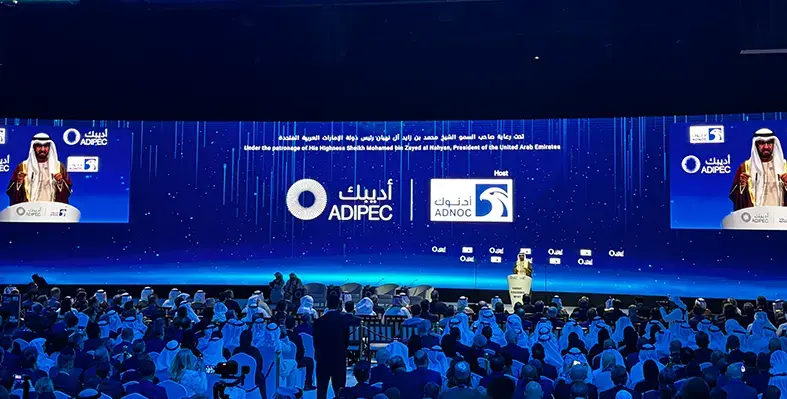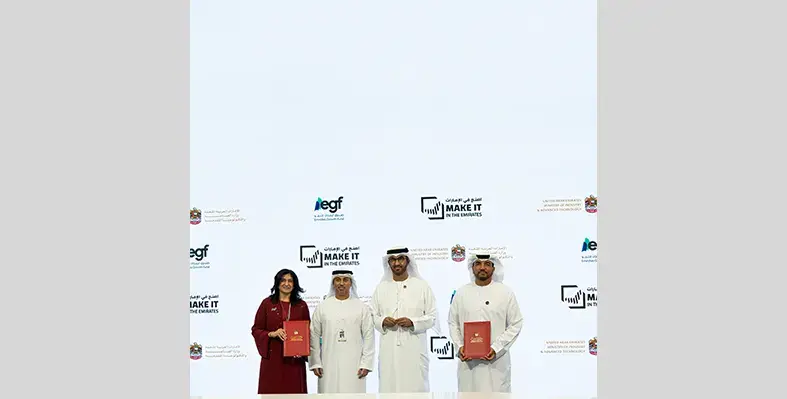Dr Sultan Ahmed Al Jaber, UAE Minister of Industry and Advanced Technology, ADNOC CEO and Masdar chairman, officially opened ADIPEC 2025 in Abu Dhabi today with a powerful call for realism, collaboration and innovation in the face of global energy challenges
Addressing global industry leaders, Dr Al Jaber urged the sector to “tune out the noise, track the signal,” emphasising that “near-term uncertainty is real, while long-term demand remains very strong.” He highlighted that energy demand will continue to grow across all sectors, noting that “renewables will more than double, funding for LNG will grow by 50%, jet fuel by more than 30%, and oil will stay above 100 million barrels per day beyond 2040.”
He stressed that “what we’re really talking about here is energy addition, not energy transition,” reinforcing that “energy equals jobs, growth, competitiveness and intelligence.”
Dr Al Jaber also underlined the UAE’s leadership in integrating AI and technology to drive efficiency. “We are laser-focused on becoming the most AI-native energy company,” he said, referencing ADNOC’s Energy to the Power of AI programme, which boosts production forecasts by 90%.
Closing his address, he urged unity and resilience. “Real progress is never the work of one single individual or company. It happens when we move together with purpose.”
Secretary Doug Burgum, 55th Secretary of the Interior, Chair, Energy Dominance Council of the United States of America spoke at the opening ceremony. He urged the global community to hasten the adoption of AI, while calling for the US to stay ahead in what he termed the “AI arms race”.
The opening of ADIPEC also saw a ministerial panel comprised of His Excellency Suhail Mohamed Al Mazrouei, the UAE’s Minister of Energy and Infrastructure; His Excellency Saad bin Sherida Al Kaabi, the Qatari Minister of State for Energy Affairs; and His Excellency Eng. Karim Badawi, Egypt’s Minister of Petroleum and Mineral Resources.
The panelists grappled with the complex future of the energy sector, emphasising the urgent need for investment, balanced policies, and collaboration across borders.
Al Mazrouei highlighted the rising demand for diverse energy sources. “We will definitely need more oil, definitely more gas, definitely more renewable energy,” he noted, adding, “If we’re not investing in a large scale... we will have an issue down the road.”
Addressing geopolitical uncertainties, Al Kaabi warned of the consequences of regulatory decisions. “If Europe does not really look at how they can water down the CSDDD... we will not be delivering energy to Europe for sure, 100%.”
Both the US and Qatar have warned the European Union that its Corporate Sustainability Due Diligence Directive (CSDDD) could disrupt liquefied natural gas (LNG) supplies to Europe. They are concerned that penalties of up to 5% of a company's global annual turnover for non-compliance could make it unprofitable to supply Europe, and have urged the EU to revise or repeal the CSDDD. Qatar, a major LNG supplier to Europe, stated that it would halt exports to the bloc if it faced such fines.
Al Kaabi emphasised, “We shouldn’t be following politics when we look at the lives of people and how much energy we need.”
Badawi brought focus to regional innovation and cooperation, “Egypt is very much focused in terms of unleashing the potential of the mining sector,” he said. He also stressed the importance of diverse strategies, explaining that Egypt is “Very much focused on creating the energy mix, which leverages renewables, oil, gas, and nuclear.”









